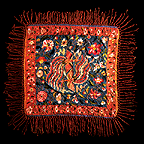 Embroidered Canopy: Yuan dynasty, L 58cm W 58cm; of two phoenix and flowers - decorated at borders with brown silk cord knotted into a fringe. Embroidered Canopy: Yuan dynasty, L 58cm W 58cm; of two phoenix and flowers - decorated at borders with brown silk cord knotted into a fringe. |
Introduction to the Exhibition || Catalogue of the Exhibition
| June 23rd marks the opening of a major exhibition of Chinese textiles from the Song, Yuan, Ming and Qing dynasties, "Heavens' Embroidered Cloths: One Thousand Years of Chinese Textiles". Jointly organised by the Oriental Ceramic Society of Hong Kong and the Urban Council, the exhibition will be held between 23rd June and 17th September at the Hong Kong Museum of Art. The 300 objects on view range from the Song to the Qing dynasties and include more than 20 pieces of kesi and embroidery from the Liaoning Museum in Shenyang, China; rare examples of needlelooping, Ming rank badges and imperial robes from a noted private collection and a large embroidered Yongle mark thanka. The exhibition will be celebrated with a major conference Chinese Textiles: Technique, Design And Patterns of Use, organised by The Textile Society of Hong Kong, June 24-25, 1995. Please click here for an Introduction to the Exhibition by Gerard C. C. Tsang, Chief Curator of the Hong Kong Museum of Art.
|
 Embroidered Canopy: Yuan dynasty, L 58cm W 58cm; of two phoenix and flowers - decorated at borders with brown silk cord knotted into a fringe. Embroidered Canopy: Yuan dynasty, L 58cm W 58cm; of two phoenix and flowers - decorated at borders with brown silk cord knotted into a fringe. |
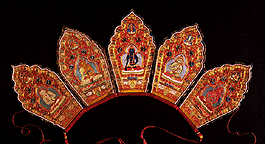 Diadem:
embroidered, 17th century, Height of each panel 20cm, max width 12cm.;
this would have been worn by a lama at a monastery. Diadem:
embroidered, 17th century, Height of each panel 20cm, max width 12cm.;
this would have been worn by a lama at a monastery. |
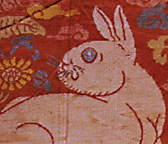 Moon Rabbit Badge: brocade, Early Ming dynasty; L 27.5cm W29cm. This is probably a festival badge worn by a court lady or a eunuch. Moon Rabbit Badge: brocade, Early Ming dynasty; L 27.5cm W29cm. This is probably a festival badge worn by a court lady or a eunuch. |
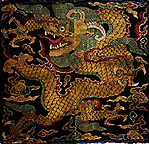 Douniu Dragon Badge: brocade, c.1500AD; L 39cm W 41cm. This fish-tailed dragon only occurs during the Ming dynasty and was awarded by the emperor for special merit. Douniu Dragon Badge: brocade, c.1500AD; L 39cm W 41cm. This fish-tailed dragon only occurs during the Ming dynasty and was awarded by the emperor for special merit. |
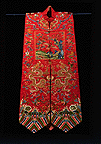 Xia Pei (woman's vest): embroidered, 18th Century; L 104cm W 52.5cm. Overvest to be worn on formal occasions, has rank badge of sixth civil rank depicted by egret in a natural landscape. Xia Pei (woman's vest): embroidered, 18th Century; L 104cm W 52.5cm. Overvest to be worn on formal occasions, has rank badge of sixth civil rank depicted by egret in a natural landscape. |
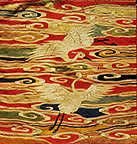 Badge of two egrets:
kesi (silk slit tapestry),15th Century; L 36cm W 36cm. This badge
depicts paired birds in flight over rocks - later badges have a single
bird perched on rocks or branches. Badge of two egrets:
kesi (silk slit tapestry),15th Century; L 36cm W 36cm. This badge
depicts paired birds in flight over rocks - later badges have a single
bird perched on rocks or branches. |
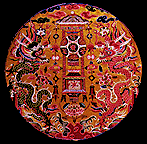 Festival Roundel: embroidery, Ming Dynasty, Wanli period, diameter 36cm. This roundel is from a court robe. Festival Roundel: embroidery, Ming Dynasty, Wanli period, diameter 36cm. This roundel is from a court robe. |
 Phoenix Badge:
kesi (slit tapestry), Late Ming (1600-1644), L32cm W 32cm. This badge
would have been worn by a princess or the highest ranking noblewoman on
the front of her robe. Phoenix Badge:
kesi (slit tapestry), Late Ming (1600-1644), L32cm W 32cm. This badge
would have been worn by a princess or the highest ranking noblewoman on
the front of her robe. |
Introduction to the Exhibition || Catalogue of the Exhibition